Part 7⁄7 The Qibla Story. The final part of this short series. What about the Ottoman Qiblas? Why do strange Qiblas exist? Why is the Qibla important to Muslims? Dan Gibson concludes by comparing Muslim and Christian concepts of prayer.
Transcript
Hello, I am Dan Gibson, and this is another video in the series The Qibla Story.
So far we have looked at the various Qiblas used in the first two centuries of Islam, and then the establishment and acceptance of the Mecca Qibla.In this video I want to briefly look at something that has puzzled some researchers. During the time of the Ottoman Empire, some Turkish mosques seem to have diverse orientations.
This was noted in a paper by Amod Jason Deus recently released on the internet. The paper is titled: Monuments of Jihad: The Thought Process of Determining Qibla Orientations by Turks.
While I totally disagree with the conclusions of this paper, written by an economist who has recently turned his attention to Qibla issues, his research illustrates a number of important issues of what NOT to do.
Now, every day readers send me emails, and many of them have good questions and suggestions. I will be using some of these in the Question and Answer videos.But every once in a while I get sent somebody’s ideas that have not been well thought through, and it seems to me that they want me to research their idea. Please, if you have an idea, like some totally new theory, please do the research yourself and then let me know about your breakthrough. Qibla studies encompass such a wide field, touching on so many disciplines, in so many places and periods of time, that I have no time to chase down new and obscure theories.
In the case of Turkey, however, several people have noticed that some of the mosques in Turkey seem to be out of alignment. They do not seem to be oriented towards Mecca.
So enter Mr. Deus who claims that many of the old Turkish mosques were oriented to face directions associated with distant Ottoman military campaigns. Now while trying to be generous, I have a great deal of trouble with this idea.
But, Mr. Deus’ study highlights some issues that need to be cleared up, before one enters into Qibla studies.
One should never assume that it is possible to use satellite images to fully understand what is happening on the ground. As I said, multiple disciplines are needed. When examining a particular structure, it is important to not only look at satellite images, but to visit the actual structure on the ground. It is also important to carefully read reports made by archeologists, historians, and architects. I have visited many mosques, I have asked friends and fellow researchers to visit others, and I rely on archeological and architectural ings made by professionals.
Now Mr. Deus provides us with a list of 205 mosques that are the basis for his study. He does not claim to have visited the inside of any of these mosques. Just as Dr. King in his study tells us that he has not visited any of the mosques outside of one, in Samarkand.
In the case of Deus’ study, we need to first divide his list of mosques into two kinds.
One, structures that were built before in arrival of Islam, and later requisitioned as mosques. These includes many churches and also other structures. These structure were not torn down and the building materials used for a totally new building. These structures were used just as they were, standing there. No thought was given to orienting the outside of the building towards Mecca. This was done on the inside, but marking the Qibla direction on the wall. So this especially applies to ancient churches.
Measuring these kinds of buildings with satellite photos is useless, because the Qibla is not associated with the structure of the building. Nothing outside, and especially looking down from a satellite, tells us what is happening inside.
Now Islam entered Turkey in the 12th century. It was part of the Byzantine Empire, and the capital city was Constantinople. That city fell to the Muslims in 1453. The Islamic takeover of Turkey took place over a two hundred year period, with slow advancement north. It was a complicated time in history.
Needless to say, in many circumstances, the invading Muslim armies captured churches, and converted them into mosques. And as we said, the outward shape of these mosques have nothing to do with the internal marking on the wall, which determines the Qibla direction.
Mr. Deus does not attempt to establish the Qibla wall for each building. He simply measures side walls, back walls and so forth. Here is what he says:
The most obvious candidate to provide insight into the thought process of determining mosque orientations is the axis of the building, as manifested by external walls, rather than some hidden artifact that can arbitrarily be placed inside in order to direct the prayer direction irrespective of the structure’s orientation.
So Mr. Deus restricts is measurements to the external walls of mosques, regardless of when and who constructed them.
Second, when it comes to the mosques that were PURPOSE BUILT, we need to recognize to different kinds of Qiblas again.First, there are mosques that were built by the Muslims from scratch. During the building process, the builders use some method to measure the Qibla wall, and include it in their building plans. The determining of the Qibla direction would have been done by someone who possessed the ability to do this.
Another category, are mosques built by Muslims, from the ground up, but they did not work out the Qibla direction for themselves, they simply copied what someone else did in a nearby mosque. Thus, all the mosques in a town or city may have somewhat a similar Qiblas, but they are all based on the very first mosque that was in the area. This is common today, even in the city of Mecca in Saudi Arabia, where the Saudi Islamic Affairs Ministry has revealed that a great number of mosques in Mecca itself have poorly aligned Qiblas due to copying from one to another, rather than measuring.
Now there is a third issue to consider.Mosques were never designed to be square, or to have square corners. This is a very western idea, and while modern building are often square, older Middle Eastern cities, and even European cities and buildings were not built square.
If a building was square, one could measure the side or back walls of the mosque and still have reasonably good results.But in the vast majority of cases, the side walls and the rear walls do not have square sides. Even the Ka’ba cube itself in Mecca does not have square corners.
Now, here is an example of how Mr. Dues has measured mosques. It is not a perfect cube.
You can see the problems with this type of research.
In a Muslim mosque, the faithful line up in long wide rows, with everyone facing the Qibla.This is different from old churches, where people sat in shorter benches or pews, and way at the front is the leader.In the oldest, purpose built mosques, all that was necessary was a long wall known as the Qibla wall. The faithful would like up facing this long wall. The rest of the building didn’t matter. Walls could go off in various directions.
As we have said, the first Qibla faced Petra in Jordan. Then as alternative Qiblas came into play, such as Mecca, or the Between Qiblas, it became important to physically mark the inside walls of each mosque.
Originally, in Medina, a sign was hung in the mosque. We talk about this in the documentary film: The Sacred City. A short while later, the mihrab nice was introduced. In some places there might have been two signs, as there certainly were mosques with two different Qiblas. Several mosques survive until today, with two different mihrabs. So this niche is a niche in a wall, and often you can see it on the outside of the building. And several mosques survive today that have two different mihrabs; one facing one direction, and one facing another.
Another issue I have with Mr. Deus’s study is that he fails to realize that Google Earth lists places of prayer along with mosques with a small symbol. This is to help the faithful find the nearest place of prayer. In the west these are often rooms in schools, universities, even in factories or airports. These prayer areas often have a sign on the wall, sometimes just a paper taped to the wall, indicating the direction of prayer. In Google Earth, or Google Maps, these all have the same symbol for both a mosque and a place of prayer.
So without carefully making a complete study, which would include the personal visit of a researcher to each mosque or place of prayer, accurate calculations cannot be made without visiting on the ground.
Instead of Mr. Deus’ 205 mosques, his list can be reduced considerably.
This still leaves the issue of irregularities in Qibla directions.Many mosques seem to be out as much as 10 degrees. I personally feel that this is still adequate to say that the mosque is oriented towards Mecca. I would allow up to 12 degrees variation without too much concern.
For instance, here is the old city of Edirne in Turkey. In the top right is the Bermali Mosque. I have marked the direction to Mecca in yellow.
In the center is the Eski mosque. The grey building to the left is not a mosque.
And on the right is the large Selimite mosque. Notice that none of these mosques are aligned exactly to Mecca, and they are all slightly different from each other.
Now in this image, the red line marks the direction of Mecca. The middle red line marks the Qibla of the mosque.
Mr. Deus claims that the mosque does not face Mecca. So he has looked around and decided that this mosque is actually facing Larnaca, in Cyprus, which is the yellow line. His reason for facing Larnaca in Cyprus, is that a military victory was won there around the time this mosque was built.
Now, this video is not about refuting Mr. Deus. That would mean going through all 205 mosques that he lists, and demonstrating where their Qibla directions are, and why, and so forth. I will leave that up to someone else.
What is important here is that the researcher is not just measure buildings from satellite photos. What is important here is that the researcher understands what he is researching: visiting places and understanding what is happening on the ground.
Now in doing this, it seems to me that Mr. Deus and some others do not understand Muslim prayer. Prayer or Salah in Islam is different than prayer in Christianity, and different from prayer in other religions.
There is a huge difference between Muslim understanding of Salah and Christian understanding of prayer.
In both instances, people are talking to God. But the practice and especially the reasons are totally different.
The name Islam means to submit. It means to submit to the religion that the prophet Muhammad revealed. In Islam there is no innovation or creating some new form of worship or activity. You don’t come up with new ways to pray. Islam looks back to the prophet Muhammad.
Muslims find in Muhammad everything they need. You will find Muslims carefully studying how Muhammad lived, what he did, how he did things, what he ate, how he dressed, how he approached his wives, how he treated his fellow Muslims, how he treated non-Muslims. That is why the Hadiths are so important to Muslims. That is why the early language of the Qur’an is better than modern Arabic.
I found it interesting, that many Muslims want to study the English used by King James, or by Shakespeare. For them, it is normal to look back to when the language was at its height. Muslims take great pride in being able to speak Qur’anic Arabic, the dialect and intonations that the prophet used. Christians today do not have this idea. If we study Greek, Hebrew, or Aramaic, it is so we can better understand the early texts. We do not need to emulate or act the same way as a prophet.
As I said, Muslims are endeavoring to obey the revelations given through the Prophet Muhammad. Islam is all about submission and obedience to the will of Allah as revealed by the prophet Muhammad.
In that revelation it becomes obvious that certain things should be done that please God. Islam teaches that God is pleased with prayer, with giving to the poor, fasting in Ramadan, refusing to eat or drink foods that are haram or forbidden and so forth. God takes note of those things.
Now, the Qur’an does not contain a great deal of detailed instruction. But it does clearly instruct that Muslims are to face Masjad al Haraam. This is the Qibla direction. Some Muslims pray five times a day, some pray three times a day, some pray occasionally, some try to catch up with prayer latter.
In Islam, everyone learns how to pray. Prayer is more than words. It also includes actions, and it also includes participation with others, if they are present.
Muslims line up, facing Masjid al Haraam. They stand in wide lines, shoulder to shoulder, and they repeat the same words and the same actions that they have been taught.
When a mosque is filled with 2000 people, everyone says the same words, and does the same actions… all in unison. In doing this, Muslims feel that they are obtaining some favor from God.
They also believe that there are two recording angels watching each person. One angel stands by one shoulder and one standing by the other shoulder. Each of these angels is recording in a book. The one on the right records the good deeds, and the one on the left records the bad deeds. On judgment day, these books will be presented and will be part of God’s consideration.
So for a Muslim, he wants to obey; he wants to please God. There would be no advantage to inventing a different Qibla, unless the religious leaders at that time could convince him that the different Qibla is what pleases God.
For instance, after the great earthquake that destroyed much of Petra, including the temples and the Ka’ba building in Petra, it would have been easier for the leaders to tell their followers that God had moved the Qibla to Mecca in Saudi Arabia. This new spot had no idols or temples, it was pure, and ONLY Muslims were allowed there. The earthquake proved that it was God’s will to destroy the one and bless the new one. This kind of thinking would have been needed in order to convince the faithful to change their direction of prayer.
Now, in Christianity, prayer is different.
Prayer is not about obtaining favor with God. Christians do not earn any credit with God by praying and saying lots of words.
Jesus said,
“And when you pray, do not be like the hypocrites, for they love to pray standing in public and on the street corners to be seen by men. I tell you the truth, they have received their reward in full. But when you pray, go into your room, close the door, and pray to your Father, who is unseen. Then your Father, who sees what is done in secret, will reward you. And when you pray, do not keep on saying the same words like pagans, for they think they will be heard because of their many words. Do not be like them, for your Father knows what you need before you ask him. Matthew 6:5
So, you do not see Christians praying in public places. They do not line up in public. They pray in secret; in their homes, or in churches. Sometimes they may say a few words in public to ask God to bless a meal, or ask God’s help in a discussion.
Second, Christians do not pray to gain merit with God.Yes, we know that God will reward what is done for him, at the end of our life. But prayer is not about getting merit. Christians do not need to gain merit, for they are trusting in Jesus alone to provide His merit. You see his death covers our sins; his blood washes away sin, guilt, shame and fear.
Ephesians 4 says: *It is not by works of righteousness, (or good deeds) lest any man might boast.”*We cannot say: I have done more good things than you.
Once I heard two Saudi men comparing notes. One had prayed in all the best mosques. The most blessed mosques. He had gone on Haj several times. He had given large funds as zakat. And he said: “I can drink this glass of alcohol, because I have done enough to balance it all out on judgment day.”
For the followers of Christ, we know we can never do enough. We can never gain enough merit with God. The prophet Isaiah said:All of our good deeds are like filthy rags. (aluding to toilet paper).
All of us have become like one who is unclean, and all our righteous acts are like filthy rags; Isaiah 64:6
Before a pure and holy God, everything we do is filthy and dirty. Even our good works are contaminated. Nothing we do can please God. We have no hope of salvation, outside of God’s goodness.
Imagine if a Sheik was planning a wedding feast for his son, and part of the meal is Kibdi, made of ground meat. He orders an entire truckload of ground meat from the butcher.When he goes to collect the meat, the butcher apologies to him.Sahib, he says, before I processed your order, a pagan was here, and I ground some pork for him. And then my worker forgot to clean the machine before he did your meat. I am sure it is only a small handful of pork that was ground up, but it is only such a little, in the midst of this whole truck load.
Do you think the Sheik will accept the truck load of ground meat? Such a little bit contaminates the whole.
How can we think that the filth in our lives doesn’t affect how God sees us? We listen to sermons, and think of filthy things at the same time. We pray, but our minds are on making money. We give to the poor, but we hate and despise them.
Do you think that the stuff we do will please God?
Christians are different. They look to the person of Jesus Christ. It is not what we do, but our trust in what he has already done. It is in submitting to what he has done for us. This is true submission for a Christian.
Lastly, Jesus said:*Your Father knows what you need before you ask him.”*Matthew 6. This is a promise given to Christians, that as true followers of Jesus, we can ask him things, and he will give them.
So Christians often pray to ask for things. We usually ask for things for others.It is not about riches, wealth, fame or good health for me. We want to ask for things that please God and further HIS purposes not ours. This promise does not apply to selfish people who think only for themselves. It is given to people to follow Jesus, the one who did not think about himself, but thought of us, and came to deliver us from this life of filth.
So Christians pray so that some effect will come about. Let me repeat that for my Muslim friends: Christians pray so that some effect will come about.
The Bible says: “The effectual fervent prayers of a righteous man availeth much.“(Source)
Some years ago a Christian friend of mine visited Pakistan. And one day he was taken to a new large mosque in a rural valley. Now many villagers came to this new central mosque to pray on Friday. Over 2000 people would gather.
My friend said, Wow, the effect must be tremendous, when you have 2000 people praying together.
They looked at him curiously. Effect? What effect? There is no effect.
You see, the Muslims were praying together, so that they could individually obtain favor with God. And they believed the better the place of prayer, the more favor one would obtain. Praying in a mosque is better than praying at home; and praying in a special mosque, such as those in Mecca and Medina provide even more favor with God.
Back to the Qibla: There is no spiritual advantage, in fact, it is hard to comprehend that people would disobey the Prophet, and pray in another direction, and still think that they would gain some favor with God.
No, we must not treat the Qibla direction frivolously. It is a very important part of the Islamic religion, although Christians often have a hard time understanding it. We pray because we believe God will work and God will answer prayers. There is an effect to our prayers. And so you will find Christians all over the world praying for things: praying for government rulers; praying for the people in their community; praying for healing for their friends and for their neighbors. For them prayer as an effect, and God answers prayer.For the Muslim it is all about gaining merit; gaining some credit, gaining some recognition from God. For the Christian, it is all about seeing God’s hand at work. His answering prayers as he deals with the situation in our lives and in the lives of others.
I am Dan Gibson, and this has been another video in the series: The Qibla Story
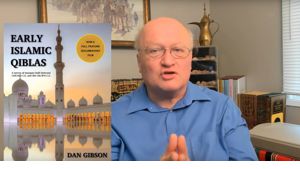
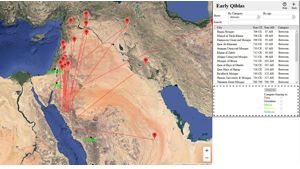
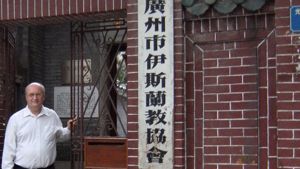
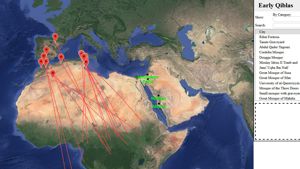
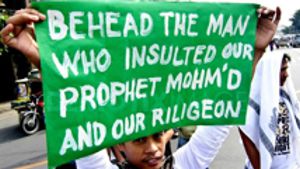
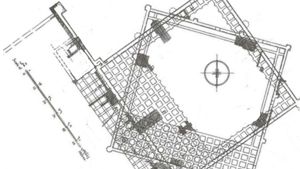
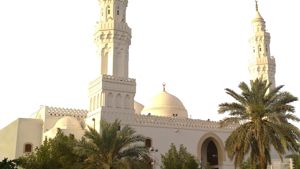
Page Discussion
Membership is required to comment. Membership is free of charge and available to everyone over the age of 16. Just click SignUp, or make a comment below. You will need a user name and a password. The system will automatically send a code to your email address. It should arrive in a few minutes. Enter the code, and you are finished.
Members who post adverts or use inappropriate language or make disrespectful comments will have their membership removed and be barred from the site. By becoming a member you agree to our Terms of Use and our Privacy, Cookies & Ad Policies. Remember that we will never, under any circumstances, sell or give your email address or private information to anyone unless required by law. Please keep your comments on topic. Thanks!